

Sony files patent for 'SmartWig' 27 November 2013Last updated at 02:42 ET.
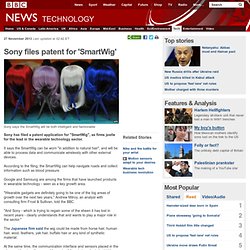
Alcohoot turns your smartphone into a breathalyzer. Breathalyzers are expensive, bulky, not always accurate, and quite frankly, not exactly the type of device you want to bust out in social situations.
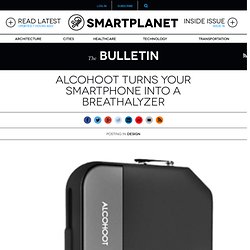
Awkward. Alcohoot, an Israeli startup, hopes to change that stigma and help reduce incidents of drunk driving with a functional, accurate, super sleek breathalyzer that plugs right into your iPhone, iPad or Android mobile device. The startup officially launched the product and an accompanying crowdfunding campaign yesterday. Backers can reserve the device was $75, with the first batch to be shipped by September. The device uses fuel cell sensors, the same kind used by law enforcement, making it extremely accurate. Smart thermometer helps diagnose your illness. A start-up listed on Indiegogo has nearly reached its goal of crowdfunding a smart thermometer that works with an accompanying smartphone app to match symptoms with illnesses that are in the community and communicate with doctors.
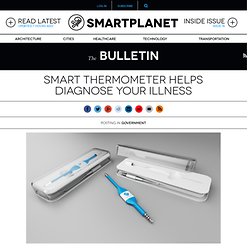
The Kinsa Smart Thermometer has today surpassed over US$36,000 of its $50,000 goal that will fund manufacturing and marketing activities. GE to invest $2B into digital health care movement. General Electric says it will invest $2 billion over the next five years to build software aimed at harnessing the growing influx of digital data in order to improve efficiency and clinical processes in the health care industry.
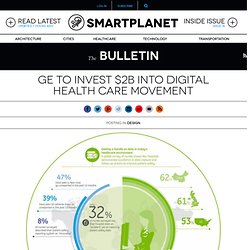
The investment is designed to advance what GE Healthcare already offers. And while, GE's investment will be focused on the productivity challenges faced by health care organizations "around the world," the software could be particularly timely for U.S. facilities. Hospitals are spending millions of dollars to upgrade their IT systems and implement electronic medical record systems in order to meet new federal guidelines mandated by the Affordable Care Act. Under the federal mandate, health providers will receive incentives to switch from paper-based to electronic systems. Those providers face penalties if they haven't made the switch by 2015. At the same time, hospitals, clinics and other health care facilities are faced with a growing mountain of data.
Related: Smart gates improve the worst part of international travel. Sure, long, cramped flights and jet lag can make international travel miserable.

But what raises my blood pressure the most are the customs officers waiting to greet me at the airport. But in Dubai the immigration process is getting a lot easier for frequent fliers to the city in the United Arab Emirates, thanks to smart gates. The smart gates allow international travelers from 33 approved countries to scan their passports and complete the immigration process in around 20 seconds, according to the Khaleej Times. InsideTracker strives to keep people out of doctor’s offices. There are a lot of ways to track health conditions these days.
Mobile applications can count calories, monitor fitness and heart rate, diagnose suspicious moles, and help individuals set -- and reach -- goals for personal improvement. Sign of the future: Sensors that stick everywhere. Lose your keys?
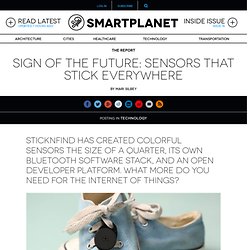
Your cat? The TV remote? StickNFind has an app for that. Better yet, StickNFind has colorful sensors the size of a quarter, its own Bluetooth software stack, and a developer platform that could turn this crowd-funded Indiegogo product into a foundation piece for the coming "Internet of Things" revolution. StickNFind Technologies, based in Davie, Fla., shipped its first products in March after raising nearly a million dollars in a campaign that ended earlier this year. Scanadu wants to make a tricorder out of your iPhone. By this time next year, you’ll be able to figure out what’s making you sick by holding a little square up to your head and reading an analysis directly on a smartphone’s screen.
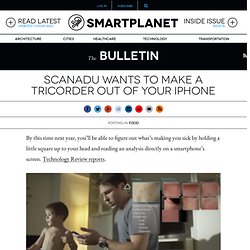
Technology Review reports. Based at NASA-Ames Research Center, Scanadu is getting ready to sell a gadget that, along with a smartphone, tracks vital signs like blood pressure, temperature, heart rate, and blood oxygenation. Healthcare in the palm of your hand. AGENDA: M-HEALTH: TOWARDS BETTER CARE, CURE AND PREVENTION IN EUROPE. Can medical tricorders disrupt global healthcare? Breathalyzer hooks up to smartphone, detects fat burn. For people trying to lose weight, scales and body mass indexes can’t always indicate if a new diet or workout is burning the desired amount of fat.
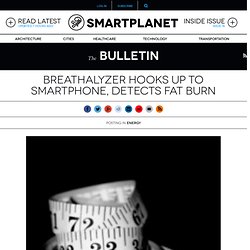
They’re also not convenient measurements to take when you’re out, and turns out, those aren’t very good predictors of fat burn at all. Now, researchers at NTT Docomo -- Japan’s largest mobile-phone provider -- are working on a smartphone-connected device that measures acetone in the breath as a sign of fat-burning. Technology Review reports. Researchers print biometric sensors directly on skin, make wearable health monitors more durable. Many health apps are based on flimsy science at best, and they often do not work. Since then, the Food and Drug Administration has been mired in a debate over how to oversee these high-tech products, and government officials have not pursued any other app developers for making medically dubious claims.
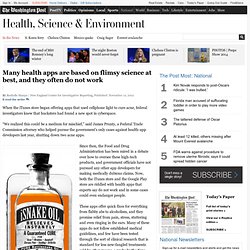
Now, both the iTunes store and the Google Play store are riddled with health apps that experts say do not work and in some cases could even endanger people. These apps offer quick fixes for everything from flabby abs to alcoholism, and they promise relief from pain, stress, stuttering and even ringing in the ears. Many of these apps do not follow established medical guidelines, and few have been tested through the sort of clinical research that is standard for less new-fangled treatments sold by other means, a probe by the New England Center for Investigative Reporting has found. While some are free, thousands must be purchased, at prices ranging from 69 cents to $999. ‘Bogus’ claims When contacted, Apple declined to discuss its apps or its app development process. PC Magazine April Issue Now On Sale: Tracker Nation. Welcome to the third wave of wearable technology. Lab-on-a-chip. Timeline: Smartphone-enabled health devices. Zeo Sleep Manager: Review.
Apple Gives Massive Nod To Wearable Tech in New iOS 7 Update. Apple may not have unveiled its own smartwatch during this week’s WWDC event but it gave a massive nod to the wearable tech industry with the inclusion of two Bluetooth features in iOS 7. One of the frustrating things with wearable devices for iOS users today is the need to use third party services to get notifications or collect data. Wearables, like the Pebble and Nike’s Fuel Band, require apps or even workarounds like IFTTT, in order to perform some of their core functions. At this week’s WWDC, Apple cleared the deck of these issues by opening up two Bluetooth driven features: Apple Notification Center Service (ANCS) and the Preservation and Restoration Service. These services are critical at pushing notifications from iOS to a Bluetooth Smart device (ANCS) and passively collecting and storing data from a Bluetooth device back to an app on your iPhone or iPad.
“I hope this means that Apple recognizes both the value and consumer demand for connected wearables. Timeline: Smartphone-enabled health devices. About the Quantified Self. The Quantified Self is an international collaboration of users and makers of self-tracking tools. Lab-on-a-chip.